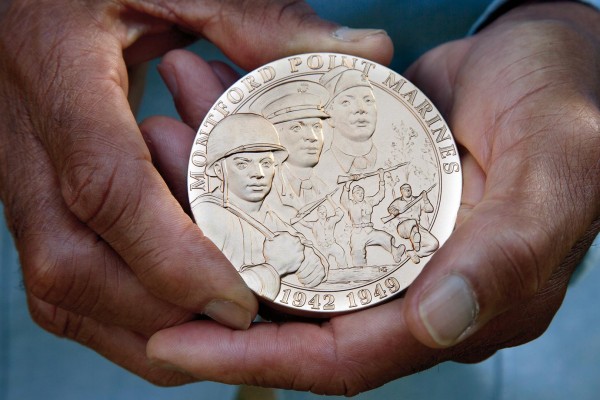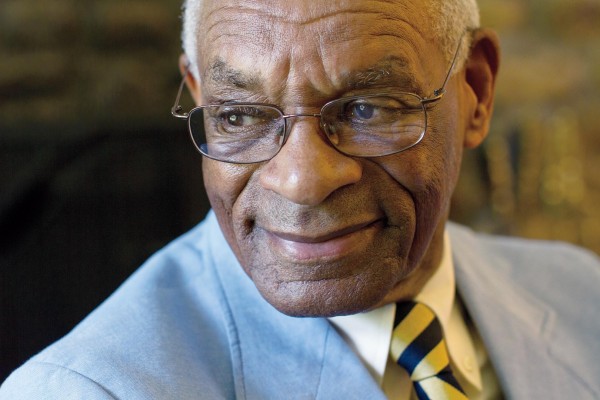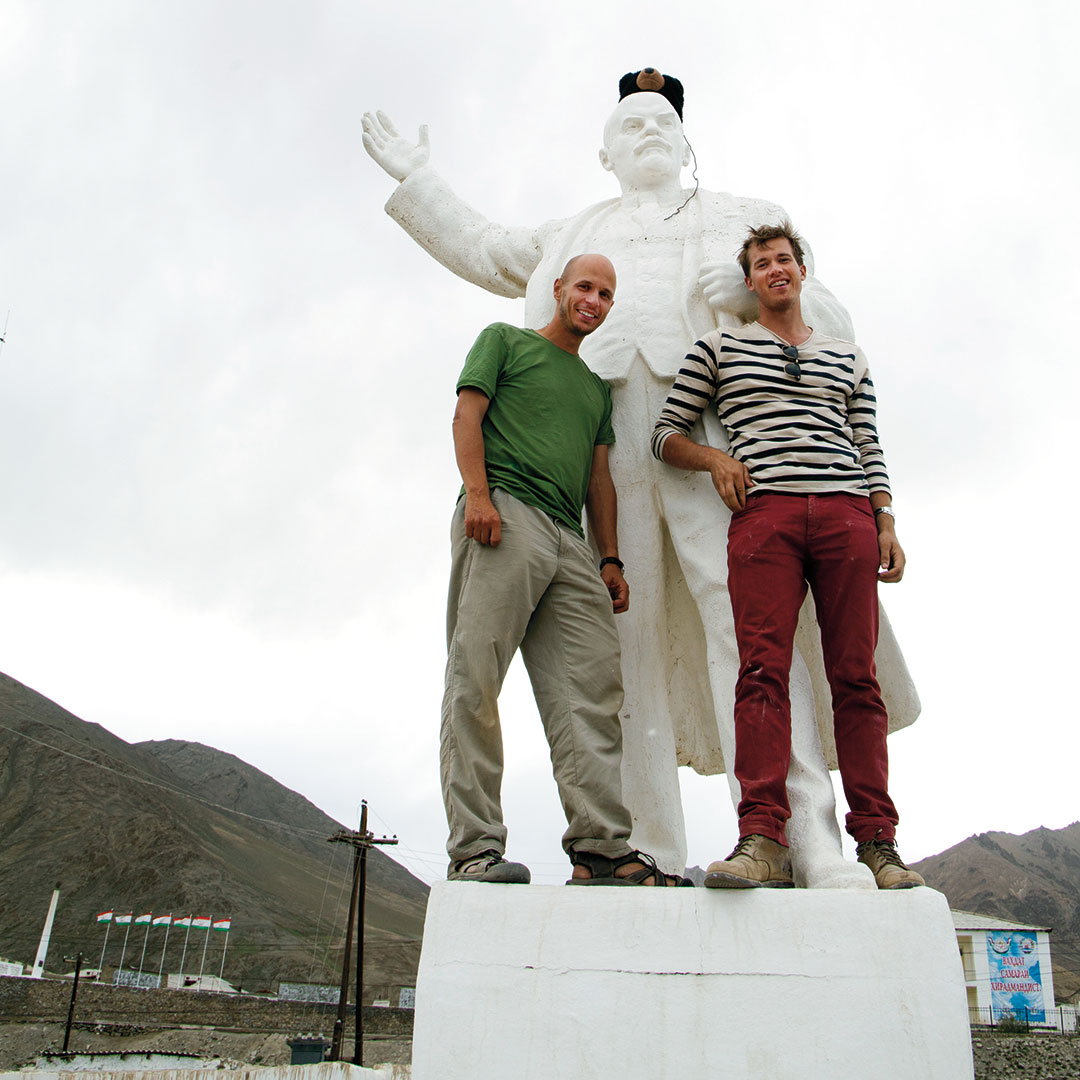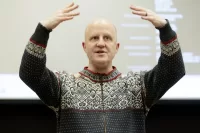
The Beachhead in North Carolina: Nathaniel Boone ’52 and the Montford Point Marines
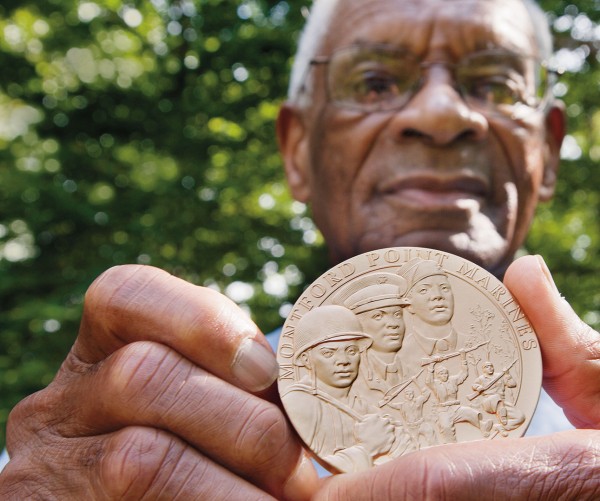
Shown at his Manchester Center, Vt., home in September 2012, Nathaniel Boone ’52 displays his replica of the Congressional Gold Medal awarded to the Montford Point Marines. Photograph by Phyllis Graber Jensen/Bates College
Like many Bates alumni of a certain era, Nathaniel Boone believes that his college experience was largely defined by “Cultch” — the series of Cultural Heritage courses that painted 2,000 years of human development in broad sweeping brushstrokes.
But Boone’s appreciation of humanity’s evolution may be sweetened by knowing that he played a role in one of the sweeping historical changes of his own time. He is one of about 400 surviving “Montford Point Marines,” the first African Americans to serve in the U.S. Marine Corps.
“We were fighting the war before we encountered any enemy.”
Given basic training in the 1940s at the racially segregated Montford Point facility at Camp Lejeune, N.C., thousands of black Marines broke the Corps color barrier in a time and place where desegregation was anything but welcome.

Wearing dress blues, Marine Cpl. Nate Boone poses for an unnamed buddy in front of a barracks at Montford Point, Camp Lejeune, N.C., in 1947. Photograph courtesy the Boone family
“This was a swampy area, infested with snakes,” says Boone, a retired attorney who now lives in Manchester Center, Vt., with his wife of 55 years, Harriet Howell Boone ’52. “The barracks were made, more or less, of a glorified cardboard. And there were no black officers at that time.”
“We had difficulty in the town near the base, which was Jacksonville, because the whites didn’t want us there. And the white officers didn’t want us there,” Boone says. “So we were sort of fighting the war before we encountered any enemy.”
Traveling from his home in Englewood, N.J., to North Carolina, Boone had to change buses in Washington, D.C. — and move to the back of the bus. “That’s where the segregation started, in our nation’s capital,” he recalls.
But Boone made a return visit to the nation’s capital last June that may have eased the sting of that insult, as he and the other remaining Montford Point Marines — totaling 420, out of close to 20,000 who trained at the camp from 1942 to 1949 — received the Congressional Gold Medal, the highest civilian honor bestowed by the government.
“It brought me to tears, because the Marine Corps has changed so much,” he says. The Marines at the two-day event, he adds, “treated us like royalty. And to see the rank that the ladies, black and white, had achieved, and to see black generals, which I didn’t think would ever happen in the Marine Corps.”
Back in 1946, Boone understood what he was getting into, partly because his mother and aunt, who had grown up in Georgia, gave him ample warning of what he could expect in the Jim Crow South. But, Boone says, “nothing that was said to me deterred me, because the only way I could go to college was the GI Bill.”
While college leaders feared that this landmark legislation would open their hallowed gates to the rabble and thereby debase U.S. higher education, the GI Bill had just the opposite effect: Veterans-turned-students from all walks of life, instead, brought new vitality and ideas to the U.S. academy.
Indeed, Boone says, “I think it’s frankly one of the best things the United States ever did because it developed a middle class and it allowed a lot of individuals to go to college” who otherwise never would have.
Boone joined the Marine Corps because “the only way I could go to college was the GI Bill.”
Cultch and all, Bates prepared him well for law school, Boone says — he put himself through at Boston University by scrubbing floors in a restaurant — and for a long law career in Hackensack, N.J.
Even though Montford Point and his Marine Corps career got Boone the college education he wanted, the medal is a welcome recognition of both the trials those pioneering black Marines went through and their contribution to a country that, at the time, was hardly gracious about it.
“I’m honored to receive this award,” says Boone. “I did some research and I found out some of the people who received this award” — a list that starts with George Washington and goes on to include other presidents, war heroes and such notables as Martin Luther King Jr. and Coretta Scott King, the Tuskegee Airmen and the Native American “code talkers” who used their own languages to encode military messages during World War II.
“I’m in fairly good company,” he laughs.
Video about Nate Boone bates.edu/nate-boone-marine
